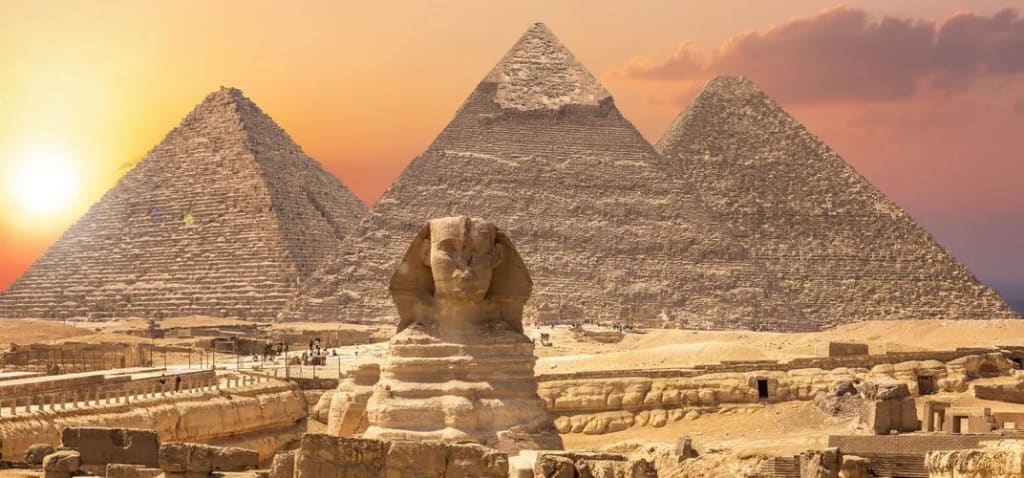
Introduction:
Egypt, often referred to as the "Gift of the Nile," stands as a testament to the enduring marvels of human civilization. This ancient land, with its iconic pyramids, monumental temples, and rich cultural heritage, has a history that spans thousands of years. Join us on a captivating journey through the epochs of Egypt's past, where pharaohs ruled, hieroglyphs adorned the walls, and the Nile River played a central role in shaping the destiny of this extraordinary civilization.
1. **The Dawn of Civilization (c. 3100 BCE - 2686 BCE):**
The history of Egypt begins with the unification of Upper and Lower Egypt by King Menes, marking the commencement of the First Dynasty. The Nile River, the lifeblood of Egypt, facilitated agricultural prosperity, leading to the growth of settlements along its banks. The construction of the Step Pyramid of Djoser, designed by the architect Imhotep, showcased early Egyptian ingenuity in architecture and engineering.
2. **The Old Kingdom (c. 2686 BCE - 2181 BCE):**
The Old Kingdom is renowned for the construction of the Great Pyramids of Giza—wonders of the ancient world. Pharaohs such as Khufu, Khafre, and Menkaure left an indelible mark on the landscape with these colossal structures. Hieroglyphic writing and intricate burial practices reflected the Egyptians' religious beliefs centered around the afterlife.
3. **The Middle Kingdom (c. 2040 BCE - 1640 BCE):**
After a period of decentralization known as the First Intermediate Period, the Middle Kingdom brought stability and cultural flourishing. Pharaohs like Amenemhat I and Senusret III undertook ambitious construction projects, and literature, such as "The Tale of Sinuhe," highlighted the sophistication of Egyptian storytelling.
4. **The New Kingdom (c. 1550 BCE - 1070 BCE):**
The New Kingdom ushered in an era of imperial expansion, as mighty pharaohs like Hatshepsut, Thutmose III, and Ramses II extended Egypt's influence into neighboring territories. The Valley of the Kings became the final resting place for many pharaohs, housing intricate tombs filled with treasures.
5. **The Late Period (c. 664 BCE - 332 BCE):**
The Late Period witnessed the decline of native Egyptian rule as foreign powers, including the Persians, Greeks, and Romans, exerted influence. Cleopatra, the last Pharaoh of Egypt, famously aligned herself with Roman leaders such as Julius Caesar and Mark Antony.
6. **Greco-Roman Egypt (332 BCE - 395 CE):**
Alexander the Great's conquest marked the beginning of the Hellenistic period, blending Greek and Egyptian cultures. The famous Alexandria Library emerged as a center of learning and scholarship. Egypt later became a Roman province, and the rise of Christianity contributed to the gradual decline of ancient Egyptian religious practices.
7. **Legacy and Rediscovery:**
The legacy of ancient Egypt endures in modern times. The decipherment of hieroglyphs by Jean-François Champollion in 1822 opened the door to understanding Egypt's written records. Today, archaeological discoveries continue to unveil the secrets of this ancient civilization, captivating the world with insights into art, science, and spirituality.
Conclusion:
Egypt's history is a tapestry woven with threads of innovation, cultural richness, and enduring legacy. From the grandeur of the pyramids to the wisdom preserved in ancient texts, Egypt's contributions to human civilization remain a source of fascination and inspiration. As we traverse the annals of time, we find echoes of ancient majesty that continue to captivate the imagination of those who seek to unravel the mysteries of this remarkable land. As the sands of time continued to shift, Egypt's history persisted through the ages, leaving an indelible mark on the global narrative of human civilization. The ancient wonders that graced the Nile's banks stood as testaments to the ingenuity and architectural prowess of the Egyptian people. The mysteries concealed within the Sphinx's gaze and the hieroglyphs etched on temple walls fueled the imagination of scholars and explorers for centuries.
In the modern era, the 19th and 20th centuries witnessed a fervor of Egyptomania, with adventurers and archaeologists unearthing the remnants of a glorious past. The Valley of the Kings yielded treasures that whispered tales of pharaohs and their quest for immortality. The Rosetta Stone, a linguistic Rosetta Stone in itself, became a key to unlocking the secrets of hieroglyphs and understanding the nuances of ancient Egyptian language and culture.
The fascination with Egypt transcended borders and cultures, permeating literature, art, and popular culture. From Hollywood blockbusters depicting mummies coming to life to the intricate detailing of Egyptian motifs in contemporary fashion, the allure of this ancient civilization continued to thrive. Museums around the world proudly displayed artifacts that once adorned the lives of pharaohs, priests, and commoners alike.
In the 21st century, advancements in technology have allowed for even greater insights into Egypt's past. Non-invasive techniques like ground-penetrating radar have revealed hidden chambers within ancient structures, teasing at the possibility of undiscovered tombs and treasures. Ongoing excavations in sites like Saqqara and Luxor promise to unveil new chapters in the ever-evolving story of Egypt.
As we reflect on Egypt's history, we must acknowledge the resilience of its people, who, despite facing challenges and upheavals, have preserved and celebrated their cultural heritage. The chants of ancient hymns, the scent of incense wafting through temple ruins, and the rhythmic flow of the Nile—all serve as reminders of a civilization that endured and flourished against the backdrop of time.
In conclusion, the history of Egypt is a tapestry woven with threads of innovation, cultural richness, and an enduring legacy that has transcended millennia. From the banks of the Nile to the towering pyramids, Egypt's narrative resonates with echoes of an ancient majesty that continues to captivate, educate, and inspire generations across the globe. The story of Egypt, with its chapters of pharaohs, gods, and timeless wonders, remains an integral part of the shared heritage of humanity.






Comments (3)
so informative
Interested
Love this concept